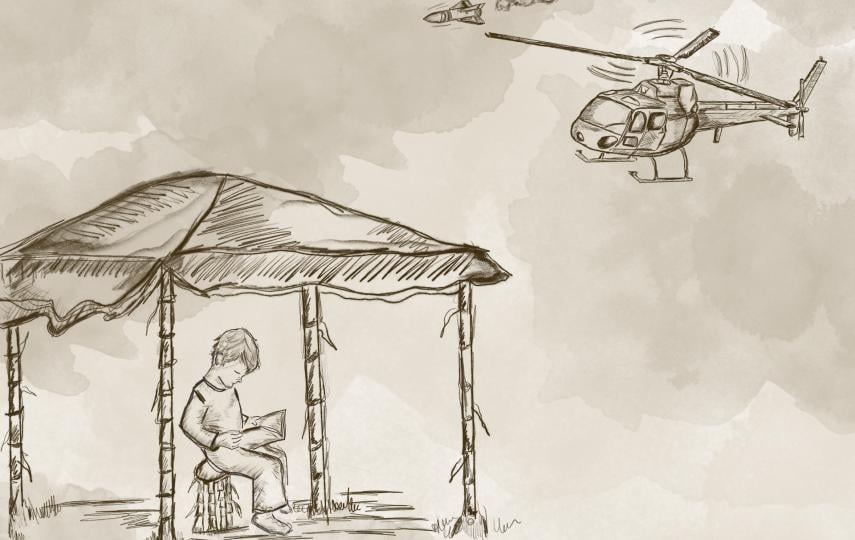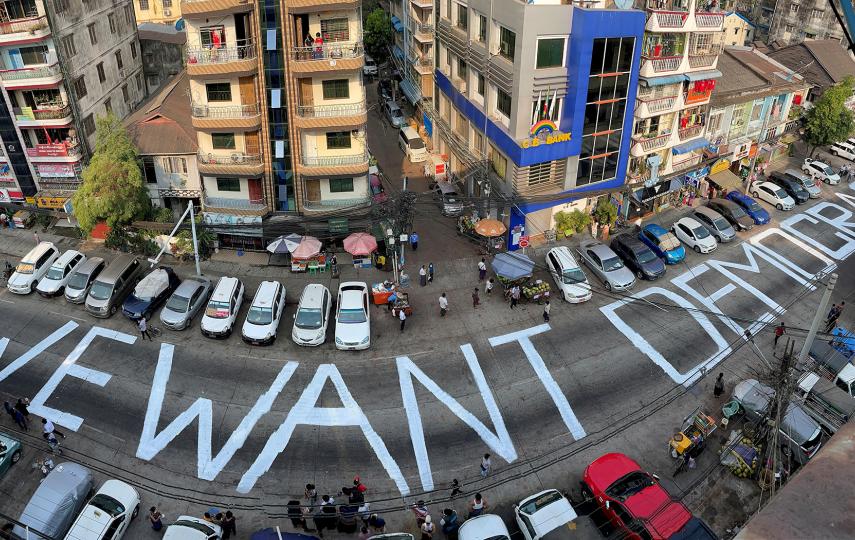Myanmar’s crisis has been forgotten by the world and neglected by aid donors, two years since the February 2021 failed coup.
Despite waning media headlines, the Myanmar military continues to commit atrocity crimes with total impunity. Its forces have killed thousands, detained at least 17,000, and massacred, tortured, and inflicted violence on people nationwide. Villages have been reduced to ashes by military arson attacks and airstrikes.
According to ACLED, an organisation that collects data on conflict severity, Myanmar ranks among the countries that saw the most intense levels of violence and conflict deaths last year, next to Ukraine. At least 1.1 million people have been displaced since the failed coup, and 17.6 million need humanitarian assistance this year, according to the UN.
Myanmar and Ukraine share equal numbers of people in need, but the disparity in aid resources between the two countries is stark.
Myanmar’s response is grossly underfunded: The UN-backed response plan for Ukraine is five times higher than the one for Myanmar. Last year, only 35% of the response plan for Myanmar was funded, compared with 79% for Ukraine.
Even more grim for Myanmar, the UN is targeting significantly fewer people for aid this year: 4.5 million people, compared with 6.2 million last year. The UN says this decision is based on a “realistic analysis of possible responses within a challenging access and funding environment”.
Humanitarian access is difficult in Myanmar, but there’s more than one way to reach people who need aid. Two years into this crisis, however, many international aid groups and UN agencies continue down the same worn path – partnering with the junta by signing memoranda of understanding and other problematic agreements that lend it international legitimacy.
They do this expecting that the military will cooperate and expand the space for humanitarian action – despite decades of clear evidence to the contrary. It’s either a hallucination, or a self-serving strategy that neglects the calls of the Myanmar people.
Humanitarian access is difficult in Myanmar, but there’s more than one way to reach people who need aid.
Rather than cosying up to a military junta that is the very cause of the humanitarian crisis, international actors, including aid organisations, must support the locally led aid responders delivering urgent assistance.
The UN system’s response to the crisis in Myanmar has been toothless, despite our best efforts to urge member states; the UN’s aid coordination body, OCHA; and large aid groups to support frontline humanitarians. The UN Security Council did adopt its first resolution on the country in 74 years in December, but it has no concrete measures to stop the junta’s intensifying attacks against the people of Myanmar.
The junta has long denied access to areas where there is active conflict or to territories controlled by armed resistance. These are often the only areas where people fleeing the military’s attacks are able to seek refuge. The junta weaponises humanitarian aid, cutting off access in order to starve populations that resist its attempts to rule by force. Access is only granted if the junta is able to gain political and operational advantages. It will not allow neutral access to a population in need.
Compounding matters is a new law on the registration of non-profit organisations. The law stipulates that those running an organisation not authorised by the junta can be jailed or heavily fined. People who “directly or indirectly contact” resistance forces, or those deemed to be “committing terror acts”, can face up to five years in prison. Unsurprisingly, many local organisations that do humanitarian work do not recognise the junta as a legitimate government, and refuse to register.
In a political crisis where people are fleeing and hiding from the military junta’s violent attacks, how aid is provided and who is providing it are much more important than the aid itself.
A principled way to meet the overwhelming humanitarian needs in Myanmar is to provide substantial and flexible support directly to local responders and community-based organisations that work closely with the people to resist the junta. In particular, this support should go to those with expertise and experience operating border-based assistance throughout decades of conflict and civil war waged against ethnic communities (an author of this article works with one such group).
The humanitarian catastrophe in Myanmar is, at its core, a political crisis. Donors and aid organisations face a choice. They can continue working with the illegitimate junta and risk becoming complicit in their atrocity crimes, or they can support the people’s resistance: grassroots frontline humanitarian responders, ethnic civil society organisations, and pro-democracy forces delivering assistance to those who need it most.









